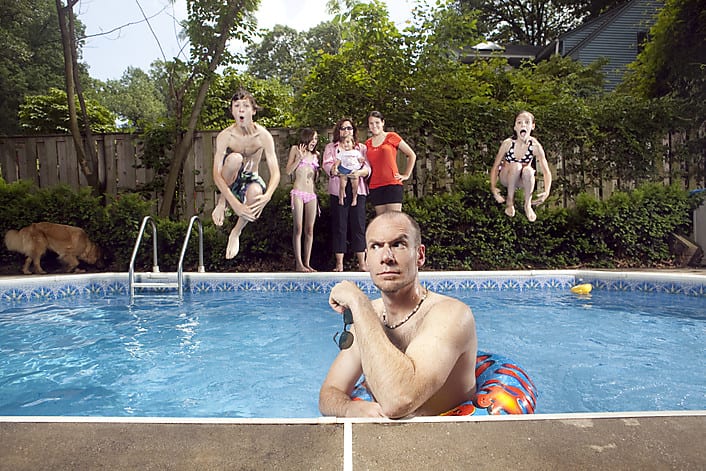27 Feb How To Stop Water Loss In Your Pool
Water Loss In Pools
And that can mean trouble for your water bill and wallet when it comes to your pool! Did you know that your pool can lose 3,000 gallons from EVAPORATION in one summer month? And that’s not all. Here’s your Summertime pool help from Benjamin Franklin Plumbing Tyler.
In our desert-like climate, the typical swimming pool can evaporate its equivalent water volume in one year – as much as 20,000 gallons of water. Along with evaporation, you will also have water lost to ‘splash out,’ the backwash process, and possible leaks.
MINIMIZE EVAPORATION
- Use a cover! This will reduce evaporation, increase safety, and keep summer monsoon dirt out of your pool, which will reduce your backwash frequency. Consider new liquid chemical covers that produce a micro-thin layer on the water’s surface.
- Do not overfill to minimize potential loss due to splashing.
- Check pool fill valves (automatic pool refillers). A fill valve can get stuck “on” and run water continuously. Turn them off or have someone check your pool when you are out of town.
- Backwash pool filters only when necessary. Backwashing more frequently wastes water. Monitor backwash. You only need to backwash until the water runs clear.
- Turn off waterfalls, water slides, or other water features when not in use.
- Use “skimmer socks” and in-line leaf traps to reduce backwashing frequency.
- Periodically check the pool pump plumbing for leaks while the pump is running.
LEAK CHECK
It is also estimated that up to 30 percent of all pools have a leak, wasting costly water unnecessarily. Since half of the pools out there have a fill valve (automatic pool refiller), leaks often go unnoticed not only occurring in aging pools but in new ones too.
Here are the Top 3 Sources For Pool Leaks:
- Cracks allow pool water to leak undetected under the pool decking or the pool itself.
- Plumbing problems or improper seals around pump fittings are often missed because they only leak when the pump is running.
- In our intense Texas sun, the ultraviolet (UV) rays will rapidly cause the white PVC pipe to degrade if it’s not painted or protected.
HOW TO FIND OUT IF YOUR POOL IS LEAKING
To determine if your pool is leaking or if it’s just the normal loss due to evaporation, use this neat trick.
- First, turn off your automatic pool refiller if you have one.
- Place a bucket of water on the top step of the pool and fill it with water to the pool’s water level. You may need to use a rock or brick to hold the bucket down.
- Mark the water level inside the bucket. Next mark the pool water level on the outside of the bucket.
- After two or three days, if the water level in the pool is lower than the bucket, there is probably a leak in the pool structure or plumbing system.
- To further detect the cause, repeat the test with the bucket. First, measure the water loss after 24 – 48 hours with the pump running, then measure the water lost again after 24 – 48 hours with the pump off. If more water is lost when the pump is running, the plumbing is probably the cause.
Need Leak Detection for your pool? We’ve got your back! Check our Discount Page and set up your appointment now at 903-730-6611.
Benjamin Franklin Plumbing Tyler serves the East Texas cities of Kilgore, Longview, Tyler, and Whitehouse with a team of certified plumbers. In addition to emergency plumbing repair, some of the plumbing services provided by the company include faucet repair, drain services, toilet repair, plumbing fixture installations, tub and shower installations, kitchen sink repair, faucet installation, water heater repair/replacement, and garbage disposal replacement. Call us today at (903) 730-6611 to schedule an appointment!


